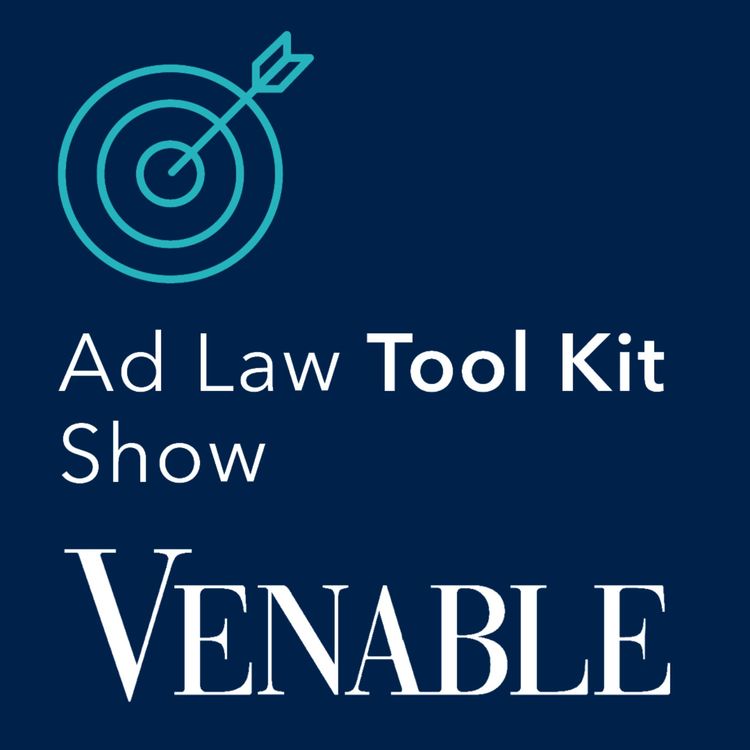Share

Ad Law Tool Kit Show
Product Safety and Recalls
Season 1, Ep. 1
•
It doesn’t happen a lot, but every so often a consumer product can be revealed to be unsafe. When that happens, it can bring up questions about a company’s obligations regarding the related products. Host Len Gordon talks to Venable partners Erin Maus and Melissa Steinman about how U.S. law requires manufacturers, retailers, and marketers to report unsafe products to the Consumer Product Safety Commission (CPSC). Compliance involves monitoring complaints, reviews, and databases. Failing to report promptly incurs penalties, while voluntary recalls might prompt false advertising lawsuits.
More episodes
View all episodes

11. Advertising Agreements
19:39||Season 2, Ep. 11The emergence of online, social media, and mobile advertising has made the outsourcing of marketing efforts important to many businesses. While this approach offers many benefits, businesses must ensure that their advertising agreements contain key provisions that will mitigate certain legal risks. Host Shahin Rothermel talks to Venable partners Bret Siciliano and A.J. Zottola about how these agreements can go wrong, and some best practices that can help businesses avoid risk when outsourcing marketing campaigns.
10. Understanding False Advertising Claims, Part 2: the National Advertising Division
21:08||Season 2, Ep. 10The National Advertising Division (NAD) is part of the BBB National Programs. Its mandate is to “hold national advertising across all media types to high standards of truth and accuracy by reviewing truth-in-advertising challenges from business, trade associations, consumers, or on its own initiative.” In 2023, the NAD closed 26% more false advertising cases than the year before. In the second of two episodes digging into false advertising claims, host Shahin Rothermel and her guest, Venable partner Claudia Lewis, discuss how marketers can reduce the risk of a competitor challenge, and what to do if you believe your competitors’ advertising is violating the law.
9. Understanding False Advertising Claims, Part I: Litigation
21:15||Season 2, Ep. 9The first rule of advertising compliance is that advertising must be truthful and not misleading to consumers. All material advertising claims also have to be substantiated. There are many venues in which a business can challenge a competitor who fails to follow those rules. What are the different ways in which an advertising claim can be false or misleading? In the first of two episodes digging into false advertising claims, host Len Gordon and his guests, Venable partners Roger Colaizzi and Liz Rinehart, discuss the many types of false advertising claims and how to be sure your business can avoid them.
8. State Privacy Laws
21:57||Season 2, Ep. 8State privacy laws continue to evolve rapidly, challenging businesses to keep pace. By the end of 2024, businesses will need to comply with up to nine comprehensive state privacy laws, with more laws slated to come into force in 2025 and 2026. To date, all such laws draw inspiration from both the first comprehensive state privacy law—the California Consumer Privacy Act (CCPA)—and the European Union General Data Protection Regulation (GDPR). But there are differences. Host Len Gordon talks to his guest, Venable partner Kelly Bastide, about which laws, if any, apply to your business and developing a practical compliance program that harmonizes with the different laws.
7. Marketing to Children
16:05||Season 2, Ep. 7When marketing to children under 13, there are heightened requirements that go beyond standard truth in advertising practices. The basic idea behind these requirements is that children have a difficult time understanding that they are being given a sales pitch and distinguishing between reality and fantasy. Host Shahin Rothermel and her guests, Venable partner Melissa Steinman and associate Shannon Sansom, discuss some best practices that companies should keep in mind when building promotions and campaigns targeted at children.
6. Made in USA Claims
19:22||Season 2, Ep. 6Many customers like to “buy American” and are willing to pay more to do so. However, if you want to call out your product’s homegrown attributes, you should know that the Federal Trade Commission (FTC), as well as some states, including California, have created very specific guidance and laws on what it means for a good to be of domestic origin. Host Len Gordon and his guests, Venable partner Mary Gardner and associate Jay Prapaisilp, look at the FTC’s detailed Made in USA guidance on product manufacture, sourcing, assembly, and labeling, and the penalties for violation.
5. Litigation Trends in Privacy Law
14:40||Season 2, Ep. 5Data breaches, cookie banners, chatbots, pixel tracking, and biometrics are just some of the trends in privacy law that are keeping litigators busy. Many technologies that are necessary to operate a website have become hot areas of litigation. But there are more trends, and more questions. Host Shahin Rothermel and her guest, Venable partner Jean-Paul Cart, discuss the states that are considering new consumer protection legislation, what other technologies are being targeted by plaintiffs, and what your business can be doing to be prepared.
4. Green Claims
18:20||Season 2, Ep. 4Protecting the environment and practicing social responsibility not only benefit the planet, but also provide a compelling value proposition. The Federal Trade Commission (FTC) has issued detailed guidance for marketers about how to substantiate green claims, and states are increasingly passing laws governing environmental advertising. Host Shahin Rothermel and her guest, Venable partner Claudia Lewis, discuss how marketers can promote the environmentally conscious aspects of their products while avoiding so-called greenwashing.
3. Drip Pricing
19:25||Season 2, Ep. 3In 2023, the Federal Trade Commission (FTC) identified two junk fees-related practices it wanted to regulate—omitting mandatory charges and fees from advertised prices and misrepresenting the nature and purpose of the charges or fees. States have been active as well. “Junk fees” or “drip pricing” would be replaced by the “total price,” which businesses would be required to clearly disclose. Host Len Gordon and his guests, Venable partner Ellen Berge and associate Jay Prapaisilp, discuss the impact bans on drip pricing might have on businesses, and what marketers should be paying attention to as total price laws come into effect.